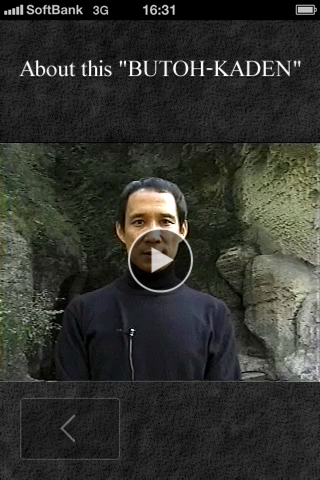
BUTOH KADEN consists of “Butoh Kaden” performance and “Butoh-fu” database.
-- What is BUTOH-FU? --
BUTOH-FU is a notation of BUTOH dance. Using few illustrations, it contains the collected words of Tatsumi Hijikata’s choreography that was verbally communicated. BUTOH-FU seems like poetry, but is the “physical language”, that indicates a dancer’s movement, a method for a dancer’s physical being, and a way of relating with space. Each word implies a certain movement, condition, a series of movement units, and a drawing reference to a dance image. In other words, it is a kind of symbol for the choreographer and dancer to share image and movement. BUTOH-FU differs either from a dance notation of the West, based on abstract and generalized rules, or a dance notation of Japan, which illustrated movement itself realistically. BUTOH-FU uses words to explain matters that cannot easily be symbolized, such as; a way of viewing and carrying an image that a dancer needs to be aware of when he dances. A word is not a tool for recording, but is used as a kind of medium to expand on a physical image with imagination.
Word of BUTOH-FU was verbally communicated to each dancer at Asbestos-kan. In this part, let us look at examples from notes that Yukio Waguri had written down from Tatsumi Hijikata’s words. They served as memorandums for his part when he was choreographed at Asbestos-kan from 1972 to 1978. It shows Waguri’s passion and self motivation to write down in shorthand and absorb the reference drawings and words that Hijikata spoke with physical gesture at the studio.
BUTOH-FU was a scenario for performance. Tatsumi Hijikata, who was occupied with creation, did not systematize his choreographic words. On the other hand so much vocabulary of BUTOH-FU had accumulated in Waguri’s notebooks while he was choreographed. It was only a matter of time until Waguri had developed a “circuit” that motivated him to categorize BUTOH-FU in terms of similarity and to think of the inter-relations of each BUTOH-FU. Furthermore, the fact that he was a leader for the male dancers part and was in the position to teach Hijikata’s choreography to his juniors encouraged him to share his understanding of BUTOH-FU with others. This application contains “BUTOH-FU Fukanzu (the map of Butoh)”, consisted of 88 phrases chosen from tremendous amount of recorded BUTOH-FU that are categorized into 7 worlds according to Waguri’s interpretation. In his notebooks from is Asbestos era, the germ for this map are readily observed.



